- Home
- Gerald Hammond
Hook or Crook Page 2
Hook or Crook Read online
Page 2
Eric shook his head. ‘Never seen him before,’ I said.
‘Then he is not, for instance, the tenant of the beat opposite?’
‘We’ve never seen anybody fishing from the other bank,’ I said.
‘Is that so?’ McIver said quickly. I wondered what significance he found in my statement until I realized that he had recognized a chance to scrounge some free fishing.
He returned his attention to the body and suddenly stooped to point at the corpse’s cheek. I have a profound distaste for human bodies (although dead members of the animal kingdom bother me not at all) and I had been trying to avoid looking at what had once been another man, but involuntarily I followed the finger which was pointing at what, in my first fleeting glance, I had taken to be a leaf or a scrap of water-weed. The same glance took in an unpleasant dent in the corpse’s brow, made worse rather than better by the lack of blood or bruising. The flesh, where it had opened, looked bleached. I averted my eyes again, quickly.
‘A salmon fly, hooked into his cheek,’ Eric said. ‘Stoat’s tail, is it?’
‘Stoat and silver,’ said the constable. ‘Number Five hook, would you say?’
‘Four,’ I said, without looking again. Keith Calder, my partner, would by now have been down on his knees, examining the body and getting in the way of the police, but I have never had his appetite for a mystery.
Eric was becoming interested, even if he was finding the mystery itself a disappointment. ‘Seems to me,’ he said, ‘the man made a bad cast and hooked himself. Between pain and surprise, he fell and hit his head.’
‘Snapping his leader at the same time?’ McIver enquired. ‘I think the hook would have pulled through the skin before the leader would have broken. Well now, this is too heavy for me. I’ll radio for help.’
‘We could have our lunch,’ Eric suggested. ‘And then . . . Would there be any objection if we went on fishing?’
McIver hesitated, his hand hovering over the radio on his lapel. Eventually the instincts of the angler triumphed over those of the policeman. ‘You’ve paid enough for the fishing,’ he said. ‘It seems a pity to let it go to waste. Go downstream, though, for the moment. Anything that happened to the mannie happened above here.’
Chapter Two
I walked upstream to fetch our lunches from Eric’s car, which was parked on the narrow grass verge beside the first bridge.
When Eric had first visited the shop he had already been big, six foot six at least and broad in proportion, but there had been little flesh on his bones. During the years of widowerhood, in addition to fishing and shooting, he had, in common with many who are nursing an inner wound, taken to eating as a hobby and almost an artform. He now topped three hundred pounds and tried cars on as if they had been shoes. The most comfortable fit that he had found in keeping with his new image as a fieldsportsman was a large, Japanese four-wheel-drive monster. The small police panda car parked nose to nose with it looked like a toy.
I fetched our lunch basket out of the back, but before setting off I rested it on the parapet for a minute looking thoughtfully down at the water. Shadows on the bottom led my eye to several beautifully camouflaged trout; and through my Polaroid sunglasses I could make out a salmon resting in the shadow of a rock, but it would not be in a taking mood nor was my mind on fishing for the moment. The basket was heavy and I arrived back sweating in the sunshine.
PC McIver was standing guard by the body. I gave him a sandwich and a can of beer as I passed by, which was as much as he could be persuaded to accept; and I found Eric two pools lower down, wading in the shallows and casting with my rod. He joined me on the bank. No trees had been allowed to grow close to the water, but twenty yards back we were able to settle ourselves on a hummock in the shade of a silver birch.
Eric was prepared to work his way through a stack of sandwiches, several pies and a salad with enough chicken legs to have kept a whole flock on foot, followed by a slab of cake and cheese and biscuits, the whole washed down with a bottle of claret. My appetite was more quickly satisfied by a couple of pâté sandwiches, a very small paper cup of the wine and a mug of coffee.
I took up my rod and wandered back to the water. The prospects for salmon remained poor, but salmon fishing always retains an element of chuck-it-and-chance-it and I enjoy the more precise challenge of trout fishing. Several fish were rising to the insect life hatching on the water.
I dipped into my bag and tied on a team of three flies on a finer cast. I dislike leaving expensive rods locked in a car, so my trout rod was back at the hotel. A fifteen-foot salmon rod was a clumsy tool for short and accurate upstream casting, but at least it enabled me to keep back from the river’s edge and out of the sight of the fish.
By the time that Eric came at last to join me, I had landed two trout of almost a pound each and had hooked another. But my third fish had managed to snag me on something. I put down the rod and waded into the shallows. The trout had gobbled my point fly. I knocked it on the head, used the disgorger to detach it and tossed it to join its fellows on the bank.
‘They’re just tiddlers,’ Eric said.
‘But I got them,’ I pointed out. ‘Give me another hour and I’ll match the weight of your salmon. And at least they’re there. You probably caught the only takeable salmon on the beat.’
He flashed a sudden grin at me. Gone were the dull and uneven teeth of previous years. As he explained it, a pretty young dentist had said, ‘Let me take all this away from you,’ and the result was a smile that was almost blinding in the sunshine. ‘All right,’ he said. ‘Let’s have a go at the brownies.’
‘Hang on a minute,’ I told him while I groped under the water. My top dropper had hooked into something soft which moved in the water. For a moment I thought that I had found another body and my stomach gave a preparatory heave. But the object was a fishing bag. I lifted it towards the bank. Water poured out, bringing with it a host of small fish, mostly salmon fry. I decanted them carefully into the river, leaving in the bag a bulky object which turned out to be another salmon of, I guessed, about twelve pounds. It was much nibbled, but it had once been a good, fresh-run fish.
Eric was towering over me. ‘There you are,’ he said. ‘There are more salmon to be had in the river.’
‘Maybe. The police should see this. Do you want to resume fishing?’
‘And miss all the fun? No, I’m coming with you.’
‘If that’s your idea of fun, you’ll enjoy carrying the food basket,’ I told him. ‘It may as well go back to the car.’
Eric picked up the basket, which was much lighter than before, after placing his shoes on top. I gathered up our rods and trappings. At the tail of the next pool we met PC McIver. ‘I was coming to look for you,’ he said. ‘They want to ask you some questions.’
I nodded. I had been awaiting the summons in some trepidation. I hate talking with strangers outside my own territory. This may stem from the stammer that had made my youth a misery and still plagues me slightly when I get nervous, although perhaps I am confusing cause and effect. Whatever the reason, I dislike confrontations unless I am in control.
I handed over the sodden fishing bag to McIver. ‘I’ve just found this,’ I told him. He looked inside and his eyebrows shot up but he made no comment.
The body seemed to be where we had last seen it. It was now at the centre of a hive of activity. I saw the flash of a bulb. On the outskirts of the group, two men in uniform were waiting with a stretcher.
McIver left us at the edge of the trees, well back from the scene, while he approached the throng. There was some discussion and headshaking over the fishing bag and its contents. McIver returned with two men in plain clothes.
‘This is Mr James, sir. Wallace James. And Mr Eric Bell. They found the body and the bag. DCI Fergusson,’ he told us. Fergusson was a bull of a man, although he looked small beside Eric. There was a stubborn look to his face and I thought that his small eyes were looking for a reason to become suspicious.<
br />
I glanced at the other man, who was cast in the lean, dark, Celtic mould. ‘And DS Lennox,’ McIver added.
The detective sergeant produced what at first I took for a small radio and switched it on. ‘You don’t mind if we tape our discussion,’ he told me. The tone of his voice suggested that it was not a question. ‘It saves a whole skelp of note-taking.’
‘And,’ said Eric, ‘without being any more open to accusations of falsification.’
DCI Fergusson frowned loftily. McIver looked shocked. I probably looked astonished. It was unlike the placid Eric to come up with such a double-edged comment. Lennox only smiled and said, ‘Very much less. You have had problems of that kind?’
‘Never,’ Eric said. ‘A friend of mine . . .’
‘That would be in London, no doubt,’ said Lennox quellingly.
‘Mr James,’ the DCI said, but to the tape recorder rather than to me, ‘it seems a strange coincidence that the man who found the body also found what may be the dead man’s bag.’
Immediately, remembering that the finder of a body ranks high among the suspects, I felt guilty and was sure that I looked it. Eric decided to answer for me. ‘In the first place,’ he said, ‘Mr James didn’t find the body. I saw it first. In the second place, he was fishing with a team of three flies and he caught several trout.’ (I opened my own bag and exhibited my catch. The DCI seemed unimpressed but Lennox and Tony McIver leaned over for a closer look.) ‘When each of those fish was hooked it would dash to and fro and the two spare hooks would dance all over the place. If the bag had come to rest anywhere within casting range, it would have been a stranger coincidence if he had failed to hook it.’
DCI Fergusson looked at Eric suspiciously. Eric, out of the depths of his ignorance, was only stating the apparently obvious, but his vast bulk gave him an air of authority which suggested that he might know what he was talking about.
‘That is probably so,’ Lennox said.
‘Very well,’ Fergusson said at last. He turned slightly, putting Eric behind his right shoulder and out of his own view. ‘Mr James, Constable McIver tells me that you are a well-known fisherman. Is that correct?’
Questions of that sort make me want to fall over my feet. ‘I’m well known to my wife and a few friends,’ I said. ‘Beyond that . . .’
‘But you’re a qualified instructor? And you write articles in the fishing magazines?’
‘Well, yes,’ I said.
He hesitated for some seconds before deciding to open up. ‘On the face of it, this looks like a common accident. But PC McIver says that he has doubts. Has he discussed his reasoning with you?’
‘Not a word,’ I said.
‘Please let me have your opinion.’ He did not say that he would value or appreciate it, nor that he would even consider it, just please to give it.
My doubts about the putative accident were still tentative. I decided to apply the only available test before exposing them to ridicule. ‘If he had a fly-box on him, I’d like to see inside it.’
Fergusson took the tape recorder from the Detective Sergeant and nodded. The DS hurried off. ‘Why do you want to see his . . .’ Fergusson boggled at saying ‘flies’. ‘. . . . fly-box?’ he finished after a pause.
‘There are too many unknowns. One of them is, was he a competent fisherman?’
‘What difference would that make?’
‘I’ll have to go back to basics —’
Lennox returned, bringing with him a man in a plastic overall and plastic gloves who opened and displayed a flat fly-box under my nose without allowing me to touch it. ‘It was in the pocket at the top of his waders,’ Lennox said.
Two rows of salmon flies were hooked neatly into the foam backing, ranging from large to small, bright on one side and dark on the other. I nodded and the man closed the box and carried it off.
‘Well?’ Fergusson demanded.
‘I can only make assumptions,’ I said weakly.
‘Of course, at this stage. That’s what I want.’
‘Very well. I think there’s more to this than meets the eye. It may turn out to be a simple accident, but not that damn simple.’
Fergusson pushed his square jaw out at me. ‘You could tell all that by looking in his box?’
‘No,’ I said.
He sighed. ‘All right. Go back to basics.’
Eric, seeing that I was about to hold forth, looked set to take a seat on the lunch basket, property of the hotel. Rather than have him flatten it, I sat down there myself, allowing the others to tower over me. Eric moved sideways to where he could rest his back against a tree.
‘Usually,’ I said, ‘there isn’t a day in the year that a salmon isn’t coming up the Spey. But this has been an upside-down year. The Spey gets its water from the snow melting on the Grampian, Monadhliath, Badenoch and Cairngorm mountains. But last winter was exceptionally mild. There was little snow to melt up there and the summer’s been very dry. The river’s about as low as it can possibly get. Very few fish are being taken and none of those is fresh run. Yet, if that was the dead man’s bag, he had a fresh-run fish in it. It’s looking a bit tatty now and trout and salmon fry have been nibbling at it, but there’s no doubt about it.’
Fergusson glanced at Lennox, who nodded.
I was speaking with more confidence. Words came more easily now that I was on my own subject. ‘I wanted to look in his fly-box to see whether the man was a competent fisherman. And he was. A beginner tends to fill his box with weird and wonderful flies in the hope that one of them will compensate as if by magic for his lack of skill. That box held a sensible range of flies for all conditions. But it told me quite a lot more.’
Fergusson’s eyes were beginning to glaze. ‘Like what?’ he said.
‘Those flies weren’t bought out of a shop. They were hand tied, and all by the same hand which suggests that he tied them himself. And that was his own fly stuck in his cheek. The dressing was a match and there was a corresponding gap in his box.’
‘Ah,’ Fergusson said wisely.
‘But,’ I said, ‘it wasn’t a fly that a skilled fisherman would be using in these conditions. Much too large.’ I saw that Fergusson was looking at the flies on my cast, which was hooked to the reel and wound tight. ‘Nor those,’ I said. ‘Those are trout flies.’ I opened my own fly-box. ‘This is what I was using this morning.’
The Chief Inspector looked at my Garry Dog. ‘But it’s yellow,’ he said, as though he had caught me out in a lie.
‘There’s a saying — bright day, bright fly,’ I told him (the Chief Inspector looked up at the sky) ‘but that’s not my reason. I don’t believe that salmon can distinguish the colour or tone of a fly being fished near the surface. I like a bright fly because sometimes I can see it in the water and be sure what it’s doing. The salmon judges by size and movement. To it, the fly represents a small fish or a krill. The speed of the fly through the water has to be proportionate to the size of what it represents. It’s not easy to fish the fly quickly in slow water and it’s damn near impossible to fish it slowly in fast water. So you use a small fly when the water’s sluggish and a bigger one when it’s fast.’
The Chief Inspector looked round at the Spey. For most of its width, the trees on the far bank were reflected in its shining water. ‘I thought the fly was supposed to represent whatever food they were feeding on at the time.’
‘For trout, yes. Salmon can’t feed in fresh water. They’re just snapping at anything irritating that gets in their way.’
He returned his eyes to my Garry Dog. ‘The fly hooked in the dead man’s cheek was twice the size of that one,’ he said.
‘Exactly. But in his fly-box he had bright and dark flies in a range of sizes. So he subscribed to the “bright day, bright fly” custom. Here, and in this weather, he’d have been using a smaller, brighter fly. And even if he’d managed to get a fish, it would be very unlikely to be fresh run.’
‘So,’ said the Chief Inspector. He paused again
. ‘What are you suggesting?’
‘I don’t know that I’m suggesting anything,’ I said. ‘I’m just pointing out anomalies. As, for instance, where’s his rod?’
‘On the bottom of the river?’
‘Most rods have a cork handle. Even if the rest of the rod sinks, the handle usually floats up. And I was wondering . . .’
‘Yes?’
‘How did he manage to hook himself in the cheek in an upward direction?’
McIver opened his mouth but Fergusson, who evidently believed that constables should be seen and not heard, at least until spoken to, got in first. ‘That was the point young McIver made. He said that hooks catch in clothing or in protuberances like lips or ears but that they rarely dig into a more or less flat surface.’
‘I wouldn’t go along with that all the way,’ I said. ‘I’ve had to dig a few hooks out of my pupils from time to time. I’ve known one or two hook their own cheeks if they’ve mistimed the cast. But your customer had two hooks of a treble in him and they’d gone in in an upward direction. The only man I ever saw manage a trick like that had handed his rod to somebody else, turned away and walked his head into the leader — that’s the thin nylon between the hook and the fishing line proper. The leader hooked over his ear or his spectacles, we never worked out which, so that the hook came upward into his cheek.’
The Chief Inspector’s pause for thought was the longest yet. He hummed to himself while he deliberated. ‘Right,’ he said at last. ‘What conclusions do you draw from all this?’
‘None,’ I said. ‘That’s your business. And I could dream up a passable explanation for everything we’ve said.’
‘But taking everything together . . .?’
I shook my head.
The Chief Inspector turned on his heel as though to stamp off. I decided that Eric’s first remark had made him hostile and unreceptive. But to my surprise he turned back. ‘Listen,’ he said. ‘I’m not an idiot. I know that the dead man could, against the odds, have landed a fresh-run fish. He might have been trying a larger fly for some reason of his own. He might have stood his rod against a tree and walked into the leader just the way you said. After hooking himself, he might have stumbled into the water and hit his head on a rock. Yes?’

 Home to Roost
Home to Roost A Dead Question
A Dead Question Twice Bitten
Twice Bitten The Curse of the Cockers
The Curse of the Cockers In Loving Memory
In Loving Memory Illegal Tender (Three Oaks Book 12)
Illegal Tender (Three Oaks Book 12) Cold Relations (Honey Laird Book 1)
Cold Relations (Honey Laird Book 1) A Brace of Skeet
A Brace of Skeet Silver City Scandal
Silver City Scandal Sauce For the Pigeon
Sauce For the Pigeon Cold Relations
Cold Relations Hook or Crook
Hook or Crook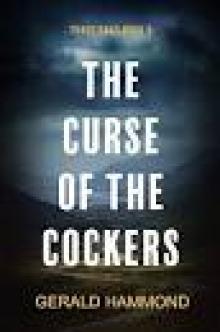 The Curse of the Cockers (Three Oaks Book 5)
The Curse of the Cockers (Three Oaks Book 5) Snatch Crop
Snatch Crop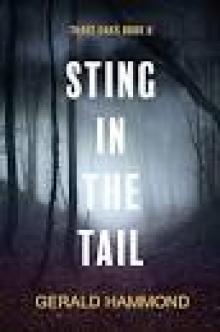 Sting in the Tail (Three Oaks Book 6)
Sting in the Tail (Three Oaks Book 6) A Dead Question (Honey Laird Book 2)
A Dead Question (Honey Laird Book 2) In Loving Memory (Honey Laird Book 3)
In Loving Memory (Honey Laird Book 3) Thin Air
Thin Air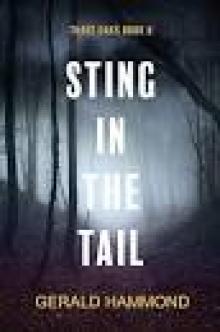 Sting in the Tail
Sting in the Tail Pursuit of Arms
Pursuit of Arms The Game
The Game Give a Dog a Name (Three Oaks Book 4)
Give a Dog a Name (Three Oaks Book 4) Fair Game
Fair Game The Executor (Keith Calder Book 10)
The Executor (Keith Calder Book 10) Whose Dog Are You? (Three Oaks Book 2)
Whose Dog Are You? (Three Oaks Book 2) Mad Dogs and Scotsmen (Three Oaks Book 7)
Mad Dogs and Scotsmen (Three Oaks Book 7) Cousin Once Removed
Cousin Once Removed The Worried Widow
The Worried Widow A Shocking Affair
A Shocking Affair Dead Weight (Three Oaks Book 11)
Dead Weight (Three Oaks Book 11) Whose Dog Are You
Whose Dog Are You The Revenge Game
The Revenge Game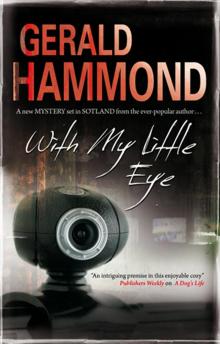 With My Little Eye
With My Little Eye Doghouse (Three Oaks Book 3)
Doghouse (Three Oaks Book 3) In Camera
In Camera Bloodlines (Three Oaks Book 8)
Bloodlines (Three Oaks Book 8)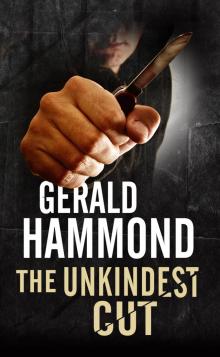 The Unkindest Cut
The Unkindest Cut